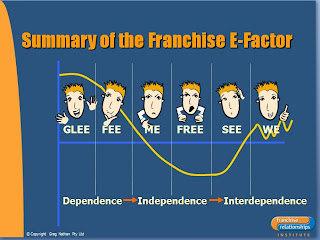The fine art of the franchise relationship!
By Nicola Maré
In the last issue we looked at franchisee satisfaction and the factors that impact thereon. An important aspect of guaranteeing franchisee satisfaction is ensuring that franchisors understand the subtleties of the franchise relationship. Personally and professionally, it is probably a more complex relationship than any other you might be involved in.
If you don’t understand your franchisees, you have no hope of communicating with them. You need to know what makes them “tick”, so that you know which buttons to press to keep them motivated and interested in maintaining standards.
However, theory is easy, the reality is a little more difficult to fulfil. As franchise organisations face the intense pressures of the marketplace, “people” sometimes are forgotten. We can’t have relationships without people and we run the risk that the human face of franchising gets buried under contracts, manuals, plans and strategies. A breakdown in the franchise relationship can lead to costly and unnecessary legal action that adversely impact the brand and the reputation the franchisor has worked hard to achieve.
It is vital that franchisors manage both the personal and interpersonal side of their organisation. People’s emotions, their values, their perceptions and their hopes for the future need to be included when planning and addressing organisational issues. What makes the franchising relationship such an intricate one, is that it is not just employer and employee. Often, the franchisee has invested their life savings to create this employment, thereby establishing a relationship that demands respect. It is important to remember that franchisees made an investment into their own business and carry the corresponding risk. The need for conformity notwithstanding, franchisees cannot be addressed in the same way you would a branch manager.
Franchising is a people business and the quality of your franchisees will determine the level of success of your franchise. In order to understand the intricacies of the ongoing relationship between a franchisor and franchisees, it is vital to know where in the franchisee life cycle your franchisees are. Knowing this will guide you in managing the relationship. As a breakdown in communication can result in unnecessary problems, it is vital to ensure you have structures in place to deal with this.
In “7 Habits of Highly Effective People”, Stephen Covey talks about three types of relationships:-
DEPENDENT - I need you
INDEPENDENT - I don’t need you
INTERDEPENDENT - We can achieve more together, than we
can independently
Greg Nathan, agreeing with Stephen Covey, says, “The principle of interdependence is extremely relevant and powerful when it is applied to the relationship between franchisors and franchisees.” He says, in the early stages of the relationship, the franchisee is usually highly dependent on the franchisor for guidance and support. As the franchisee gains more experience in the running of their business, the desire for independence will inevitably start to assert itself. He continues, “The ultimate measure of good franchisor/franchisee relationships is how successful both parties have been in navigating the independence illusion, and then to an understanding of what it takes for everyone to benefit from a healthy interdependent relationship between the franchisor, the franchisee, the customers and even, the suppliers.” Greg Nathan maintains that “Franchisors and franchisees who are able to develop this type of relationship are fortunate, for their businesses will continue to grow and prosper.”
The Franchise E-Factor - Defining the six stages of the franchise relationship
There is a journey that almost every franchisee is destined to travel. If you are beginning your journey into a new franchise business, chances are you will also travel along this path that has been named “The Franchise E-Factor” by Greg Nathan. If you are a franchisor you should be able to identify which stage your franchisees are in.
Glee: The franchisee is somewhat nervous about their new venture, but is also excited and optimistic about the future.
Fee: The franchisee starts to become sensitive and concerned about the value of the fees being paid to their franchisor or the costs of services or products received.
Me: The franchisee concludes that their success is due mainly to their own effort and plays down the contribution of the franchise system. Or if they are struggling, they play down their own deficiencies.
Free: This stage is characterised by the franchisee’s need to demonstrate their competence and assert their independence, by testing the franchise system’s boundaries.
See: Through frank and open discussions the franchisee and franchisor better understand and respect each other’s points of view.
We: The franchisee recognises that success and satisfaction come more easily from working with, rather than against, their franchisor.
Franchisees at the “WE” stage are a franchise network’s greatest asset. As a franchisor, you need to be able to facilitate the development of your franchisees through to this stage.
In conclusion, relationships always require work and your franchise relationship is no different. Building a successful relationship requires the commitment of both the franchisor and the franchisee.
If you are interested in reading more of Greg Nathan’s material please go to www.franchize.co.za/resources or contact Franchize Directions to order copies of his two bestselling books, Profitable Partnerships and Improving Field Visits.
Nicola Maré
Senior Consultant
Franchize Directions
011 803 0665 / www.franchize.co.za




Comments
Post a Comment